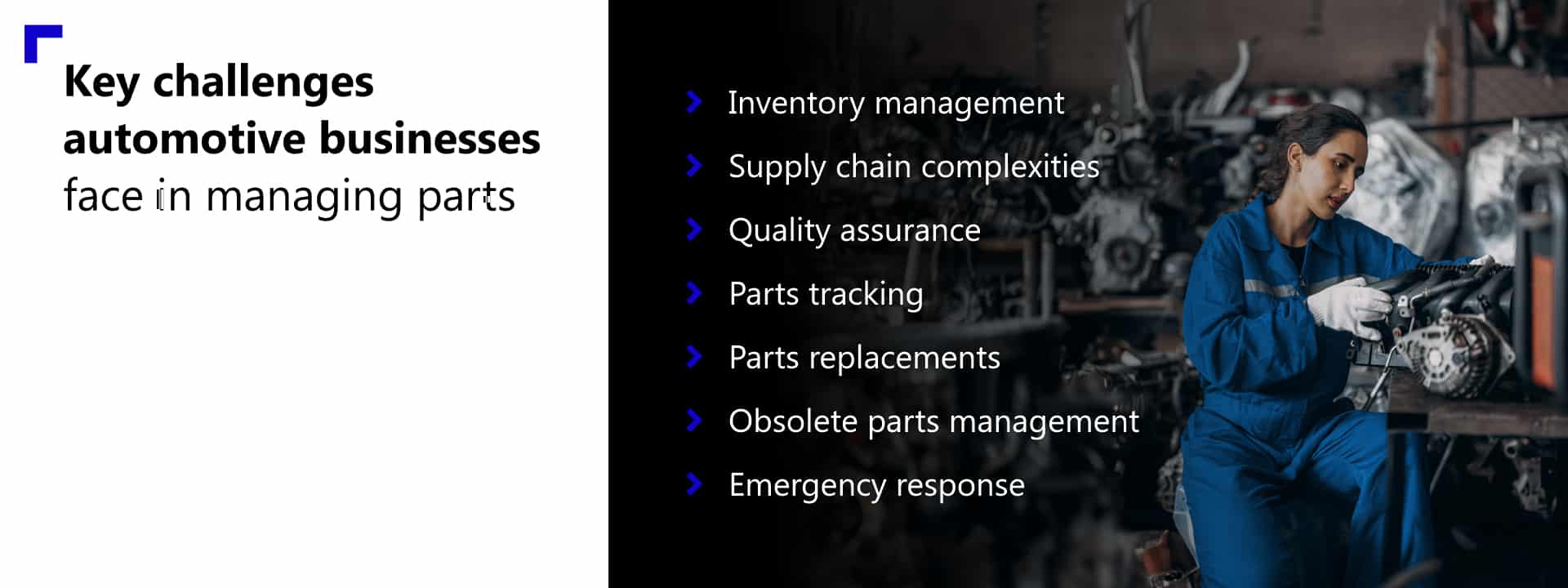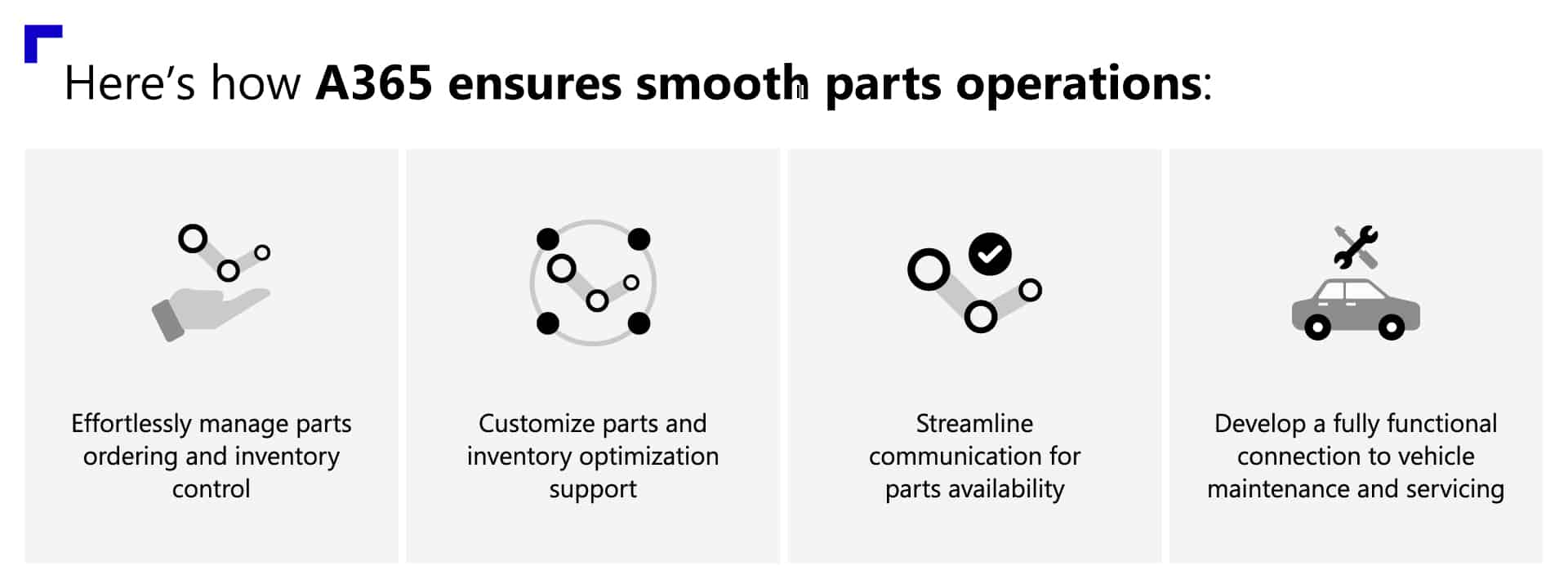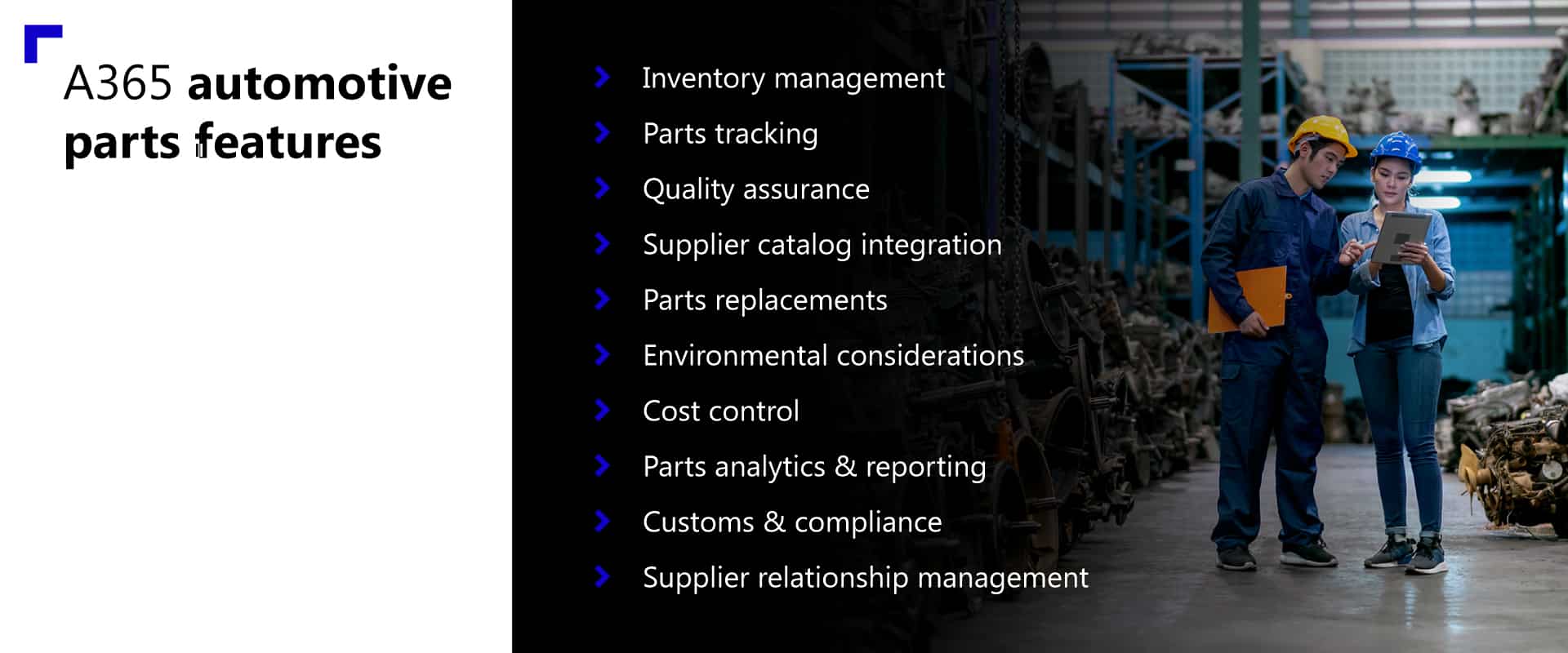Managing parts efficiently is a multi-faceted challenge for automotive businesses. They must juggle inventory levels, navigate complex supply chains, maintain strict quality standards, track components throughout their lifecycle, handle replacements promptly, manage obsolete inventory, and respond swiftly to emergencies.
The automotive parts aftermarket market in the US is estimated to grow by USD 30.83 billion from 2022 to 2027, according to Technavio. The market is estimated to grow at a CAGR of 7.69% during the forecast period.
Failure to address these challenges can result in increased costs, delays in servicing vehicles, and ultimately, dissatisfied customers. It’s a delicate balancing act that requires streamlined processes and robust systems to ensure smooth operations and customer satisfaction.
Picture this: a bustling automotive business, where parts are the key, to keeping cars on the road and customers happy. But behind the scenes, managing them is a complex dance of inventory, suppliers, quality, and emergencies, all needing a perfect performance to keep the show running smoothly.
The parts management puzzle: Challenges faced by automotive businesses
Parts management is a crucial component of the automotive industry that is often underestimated in its importance. When customers bring their vehicles in for checks, maintenance, or repairs, the availability and quality of components can greatly affect the turnaround time for servicing.
A well-managed components inventory ensures that the right parts are readily available, reducing wait times and ensuring that customers get their vehicles back promptly.
This, in turn, leads to higher levels of customer satisfaction, as customers are more likely to be satisfied with the service if their vehicles are returned to them quickly and in optimal condition. Let’s delve into the key challenges automotive businesses face in managing components and explore how they impact the industry.

1. Inventory management
One of the primary challenges is maintaining the right balance of inventory. Overstocking ties up capital and valuable storage space, while understocking can lead to delays in servicing vehicles. Automotive businesses must strike a delicate balance to ensure they have the right parts available when needed without incurring unnecessary costs.
2. Supply chain complexities
The automotive supply chain is vast and complex, with materials coming from various suppliers across the globe. Coordinating these supplies efficiently can be a daunting task, requiring meticulous planning and effective communication to avoid disruptions and delays.
3. Quality assurance
Ensuring quality is paramount to maintaining the reputation of automotive businesses. However, verifying the authenticity can be challenging, especially with the rise of counterfeit components in the market. Implementing robust quality assurance measures is essential to guaranteeing the safety and reliability of parts.
4. Parts tracking
Tracking them throughout their lifecycle is essential for efficient inventory management and customer service. Manual tracking processes are prone to errors and delays, highlighting the need for automated tracking systems that provide real-time visibility into the location and status.
5. Parts replacements
Efficiently managing replacements is crucial for minimizing downtime and maintaining customer satisfaction. However, this process can be complex and time-consuming, requiring meticulous planning and coordination between service centers and suppliers.
6. Obsolete parts management
Managing obsolete products is a challenge faced by many automotive businesses. Finding alternatives or disposing of them responsibly can be a logistical challenge, requiring effective inventory management strategies and partnerships with recycling or disposal facilities.
7. Emergency response
In emergencies, such as vehicle breakdowns, having quick access to the right parts is crucial. However, without an efficient management system in place, this can be a challenging task, leading to extended downtime and customer dissatisfaction.
Addressing challenges with a parts management solution
A parts management solution is critical for automotive businesses as it ensures efficient inventory management, leading to cost savings and improved customer service. By maintaining optimal inventory levels and reducing obsolete products, businesses can minimize downtime and enhance operational efficiency.
Additionally, a management solution enables better supplier relationships, compliance with regulations, and data-driven decision-making. This helps businesses stay competitive and deliver exceptional service to their customers, ultimately driving success in the automotive industry.
Streamlining parts operations with A365
Built on top of Microsoft Dynamics 365 and other Microsoft technologies such as Microsoft Power Platform and Microsoft Copilot, Annata’s A365 provides a comprehensive solution with parts management functionality, streamlining operations and integrating processes. This simplifies management, enhances customer experience, improves supplier relationships, streamlines processes, and reduces costs.
A365 adds substantial value for customers, service centers, dealerships, and Original Equipment Manufacturers (OEMs) by facilitating intelligence, counterfeit detection, optimized inventory, supplier management, and cost-effective procurement.
Here’s how A365 does this: 
1. Effortlessly manage parts ordering and inventory control
With A365, automotive businesses can effortlessly manage ordering and inventory control. The system provides real-time visibility into inventory levels, allowing businesses to optimize stocking levels and reduce the risk of stockouts or overstocking.
2. Customize parts and inventory optimization support
A365 offers customizable inventory optimization support. Businesses can tailor the system to their specific needs, ensuring they have the right stock at the right time.
3. Streamline communication for parts availability
A365 streamlines communication, ensuring that service centers and dealerships are always informed about availability. This helps reduce lead times and improve customer satisfaction.
4. Develop a fully functional connection to vehicle maintenance and servicing
A365 enables businesses to develop a fully functional vehicle maintenance and servicing connection. This allows for integration between management and servicing operations, improving efficiency and reducing costs.
A365 automotive parts features
Annata’s A365 offers a comprehensive suite of features designed to streamline and optimize parts management processes. Its features include:

1. Inventory management: A365 provides robust inventory management capabilities, allowing businesses to track parts throughout their lifecycle.
2. Parts tracking: With A365, businesses can easily track products from suppliers to customers, ensuring efficient inventory management.
3. Quality assurance: A365 includes features for verifying product authenticity, helping businesses maintain quality standards.
4. Supplier catalog integration: A365 integrates with supplier catalogs, streamlining the procurement process.
5. Parts replacements: A365 simplifies the replacement process, ensuring quick turnaround times for customers.
6. Environmental considerations: A365 helps businesses manage obsolete products responsibly, minimizing environmental impact.
7. Cost control: A365 includes features for cost control, helping businesses optimize their procurement processes.
8. Analytics & reporting: A365 provides powerful analytics and reporting capabilities, allowing businesses to gain insights into their parts management processes.
9. Customs & compliance: A365 helps businesses manage customs and compliance requirements related to parts procurement.
10. Supplier relationship management: A365 includes features for managing supplier relationships, ensuring reliable supply.
Adopting a comprehensive solution, like A365, offers numerous benefits for automotive businesses. From enhancing the customer experience to improving operational efficiency and ensuring regulatory compliance, A365 is the ideal solution for automotive businesses looking to streamline their parts management processes and stay ahead in a competitive market.
Interested in learning more about A365’s Parts functionality? Connect with us for a personalized discussion tailored to the needs of your business.












